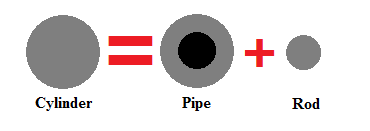Cylinder = pipe + rod
Consider an iron cylinder, which is divided to extract a rod and a pipe, whose resistances are equal.
Find R rod R cylinder .
Details and Assumptions :
R cylinder = Cylinder's radius.
R rod = Rod's radius.

The answer is 1.4142.
This section requires Javascript.
You are seeing this because something didn't load right. We suggest you, (a) try
refreshing the page, (b) enabling javascript if it is disabled on your browser and,
finally, (c)
loading the
non-javascript version of this page
. We're sorry about the hassle.
1 solution
One can also do this by equating volume of the rod and pipe.
Log in to reply
Though you got a correct answer by equating volume, but it's a wrong concept.
Log in to reply
Since R = A L ρ L 2 , where AL is the volume of the resistor ; provided the length is constant for both ( which in this case is), Akshat's method is absolutely correct :-)
Then what is the right thing ?
Log in to reply
@Akshat Sharda
–
Resistance of both the wires is same.
R
=
A
ρ
l
Resistivity and length of both of them are same. Hence, we'll compare their areas and not the volume.
I think no concept of magnetism is used.(your problem's title)=
Does we could use the area of the pipe to be perimeter of the cylinder multiplied by thickness
Its resistance are the same if its areas are iqual, so pipe's area = rod's area.
Pipes's area is ( R cylinder 2 − R rod 2 ) π
Rod's area is ( R rod 2 ) π
( R cylinder 2 − R rod 2 ) π = ( R rod 2 ) π ⇒ R cylinder 2 = 2 r rod 2 ∴ R rod R cylinder = 2